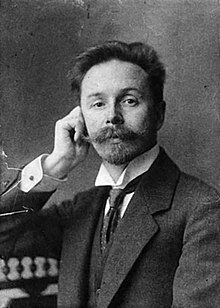
Back Aleksander N. Skriabin Afrikaans أليكساندر سكريابين Arabic اليكساندر سكريابين ARZ Aleksandr Skryabin Azerbaijani Аляксандр Мікалаевіч Скрабін Byelorussian Аляксандар Скрабін BE-X-OLD Александър Скрябин Bulgarian अलेक्सांदर स्क्र्याबिन Bihari Aleksandr Skriabin Catalan Alexandr Nikolajevič Skrjabin Czech
Alexander Scriabin | |
|---|---|
Александр Скрябин | |
 | |
| Born | Alexander Nikolayevich Scriabin 6 January 1872 [O.S. 25 December 1871] Moscow, Russian Empire |
| Died | 27 April [O.S. 14 April] 1915 (aged 43) Moscow, Russian Empire |
| Occupations |
|
| Works | List of compositions |
| Signature | |
Alexander Nikolayevich Scriabin[n 1] (6 January 1872 [O.S. 25 December 1871] – 27 April [O.S. 14 April] 1915) was a Russian composer and virtuoso pianist. Before 1903, Scriabin was greatly influenced by the music of Frédéric Chopin and composed in a relatively tonal, late-Romantic idiom. Later, and independently of his influential contemporary Arnold Schoenberg, Scriabin developed a much more dissonant musical language that had transcended usual tonality but was not atonal,[3] which accorded with his personal brand of metaphysics. Scriabin found significant appeal in the concept of Gesamtkunstwerk as well as synesthesia, and associated colours with the various harmonic tones of his scale, while his colour-coded circle of fifths was also inspired by theosophy. He is often considered the main Russian Symbolist composer and a major representative of the Russian Silver Age.[3]
Scriabin was an innovator as well as one of the most controversial composer-pianists of the early 20th century. The Great Soviet Encyclopedia said of him, "no composer has had more scorn heaped on him or greater love bestowed." Leo Tolstoy described Scriabin's music as "a sincere expression of genius."[4] Scriabin's oeuvre exerted a salient influence on the music world over time, and inspired composers such as Igor Stravinsky, Sergei Prokofiev,[5] and Karol Szymanowski. But Scriabin's importance in the Russian (subsequently Soviet) musical scene, and internationally, drastically declined after his death. According to his biographer Faubion Bowers, "No one was more famous during their lifetime, and few were more quickly ignored after death."[6][page needed] Nevertheless, his musical aesthetics have been reevaluated since the 1970s, and his ten published sonatas for piano and other works have been increasingly championed, garnering significant acclaim in recent years.[7]
- ^ "Scriabin". Merriam-Webster Online. Encyclopædia Britannica. Retrieved 6 February 2014.
"Scriabin". Random House Dictionary. Dictionary.com. Archived from the original on 19 March 2021. Retrieved 6 February 2014. - ^ Wells, John C. (2008). Longman Pronunciation Dictionary (3rd ed.). Longman. ISBN 978-1-4058-8118-0.
- ^ a b Powell, Jonathan (2001). "Skryabin [Scriabin], Aleksandr Nikolayevich". Oxford Music Online. Oxford University Press. doi:10.1093/gmo/9781561592630.article.25946. ISBN 978-1-56159-263-0.
{{cite book}}: Missing or empty|title=(help) - ^ E. E. Garcia (2004): Rachmaninoff and Scriabin: Creativity and Suffering in Talent and Genius Archived 25 September 2009 at the Wayback Machine. Psychoanalytic Review, 91: 423–42.
- ^ Bowers, Faubion (1966). "Scriabin Again and Again". Aspen Magazine (2). New York. OCLC 50534422. Archived from the original on 1 April 2008. Retrieved 14 April 2008.
- ^ Bowers 1996.
- ^ Powell, Jonathan (2001). "Skryabin, Aleksandr Nikolayevich". Grove Music Online. Oxford Music Online, Oxford University Press. doi:10.1093/gmo/9781561592630.article.25946. Retrieved 5 February 2014.
Cite error: There are <ref group=n> tags on this page, but the references will not show without a {{reflist|group=n}} template (see the help page).
© MMXXIII Rich X Search. We shall prevail. All rights reserved. Rich X Search